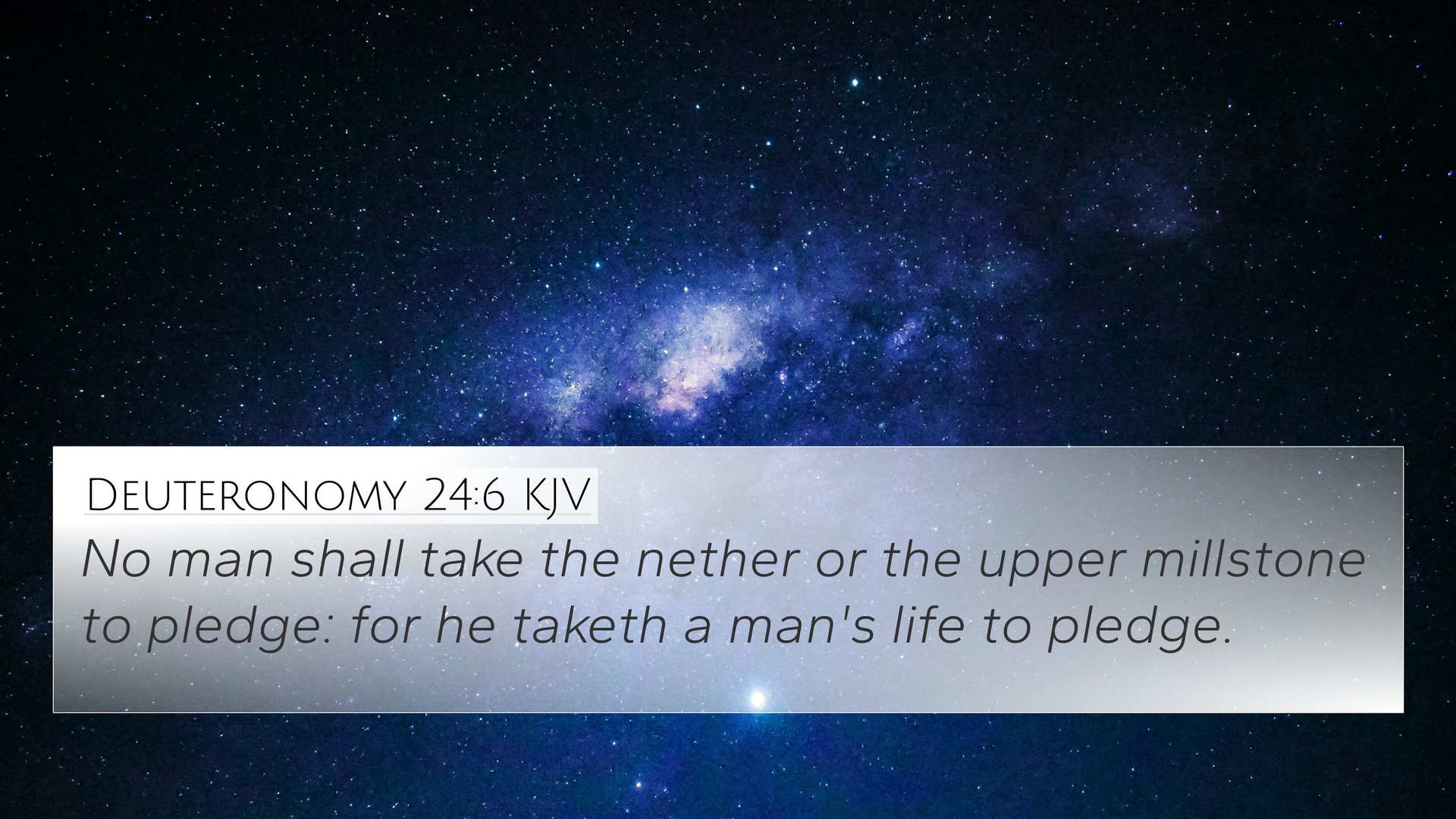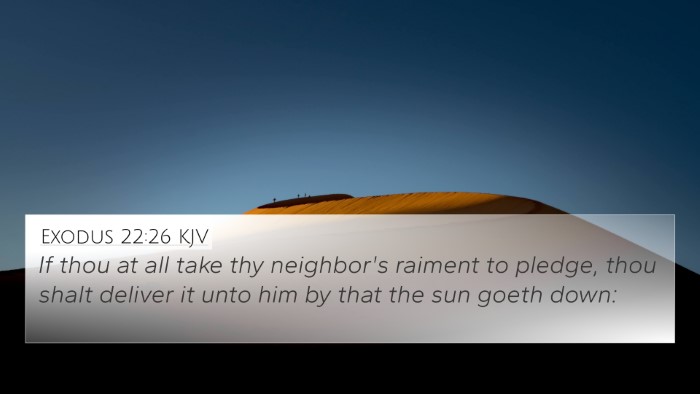Understanding Deuteronomy 24:6
Deuteronomy 24:6 states: "No man shall take the mill or the upper millstone in pledge; for he takes a man's life in pledge." This verse addresses the ethical treatment of individuals and their labor, highlighting the importance of preserving a person's means of livelihood.
Summary of Insights
This verse serves as a reminder of the moral obligations we have toward others, particularly in matters of debt and collateral. The act of taking essential tools, such as a millstone, can significantly impact a person's ability to sustain themselves and their family. Here are some insights drawn from various public domain commentaries:
- Matthew Henry: Henry emphasizes that this law reveals God's concern for the poor and vulnerable. Taking a millstone could lead to starvation, thus demonstrating the divine principle against oppression.
- Albert Barnes: Barnes notes that the millstone represents a person’s everyday needs. He explains that this law seeks to protect the individual’s right to live with dignity and the necessity of food.
- Adam Clarke: Clarke highlights the moral foundation of this command, which emphasizes humanity and compassion over strict legalism. He suggests this approach fosters a greater understanding of justice and mercy.
Thematic Connections
The teachings found in Deuteronomy 24:6 resonate throughout Scripture, illustrating the broader Biblical themes of justice, compassion, and the preservation of human dignity. Below are notable connections with other Biblical texts:
- Exodus 22:26-27: Similar principles are echoed concerning taking a cloak as collateral.
- James 5:4: This verse condemns the exploitation of laborers, reinforcing the need for fairness in economic matters.
- Luke 6:31: The Golden Rule highlights the principle of treating others as you wish to be treated, applicable in matters of debt and personal relations.
- 1 John 3:17: This passage discusses the moral duty of those who have material resources to care for the needs of others.
- Proverbs 22:16: Exploiting the poor for profit is cautioned against, aligning with Deuteronomy's protective measures.
- Matthew 18:28-30: The parable of the unforgiving servant illustrates the importance of mercy and kindness in human transactions.
- Galatians 6:2: We are called to bear one another's burdens, which includes the burdens of financial and social distress.
Practical Application of Deuteronomy 24:6
To apply the teachings of Deuteronomy 24:6 in today’s context, consider the following:
- **Fairness in Lending:** When engaging in financial transactions, ensure that terms are equitable and do not lead to the severe penalization of individuals in need.
- **Compassionate Living:** Strive to understand the context and struggles of others, offering help where possible rather than exploiting their situations.
- **Promote Dignity:** Advocate for fair labor practices and stand against oppression in any form, embodying the principles of justice found in Scripture.
Cross-Referencing for Deeper Understanding
When studying Deuteronomy 24:6, it is beneficial to employ cross-referencing tools to connect it with other Biblical themes. The following references can enhance your understanding:
- **Deuteronomy 15:7-11:** Addresses the proper treatment of poor brethren and the release of debts.
- **Leviticus 25:35-37:** Discusses helping a poorer neighbor without taking advantage of their situation.
- **Isaiah 3:14-15:** God speaks against the oppressors of the poor, emphasizing accountability in dealings with others.
- **Matthew 7:12:** Encourages believers to consider the needs and treatment of others as reflections of how they wish to be treated.
- **Romans 13:10:** Love fulfills the law; this principle should guide interactions in situations involving financial agreements.
Conclusion
Deuteronomy 24:6 carries a profound moral lesson that transcends time and cultural contexts. By understanding and applying its principles, believers can uphold dignity, justice, and compassion in a world often marked by inequality.
Further Study Resources
For those seeking to further explore the connections between Biblical texts, various tools are available:
- **Bible Concordance:** A tool to find cross-references quickly.
- **Bible Cross-Reference Guide:** Can assist in identifying parallel verses.
- **Cross-Reference Bible Study Methods:** Techniques to engage deeply with scripture.
- **Comprehensive Bible Cross-Reference Materials:** Resources that compile various themes and topics.
By delving deeper into the scriptures using cross-referencing, readers can uncover rich layers of meaning and application that enhance their understanding of the Bible and their spiritual walk.







